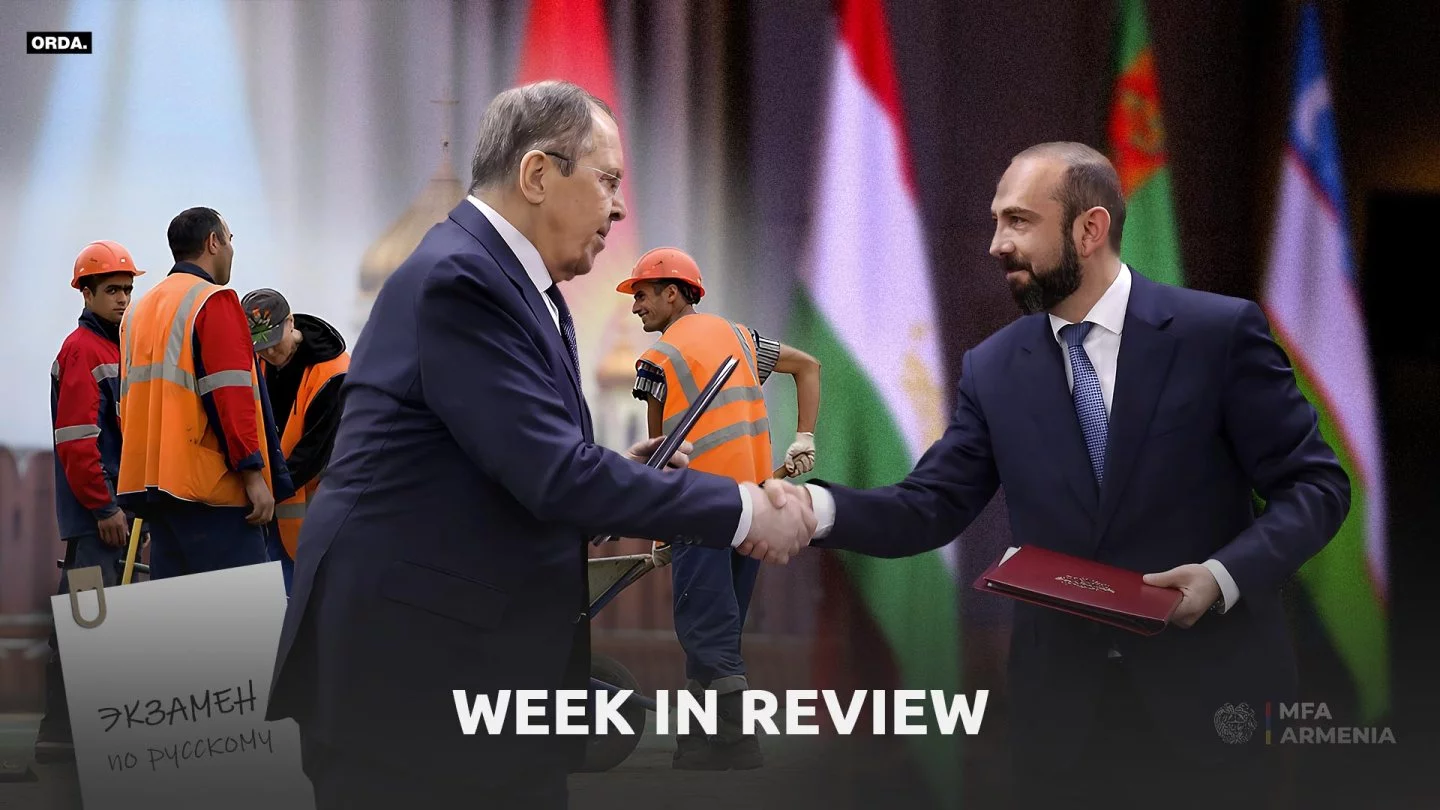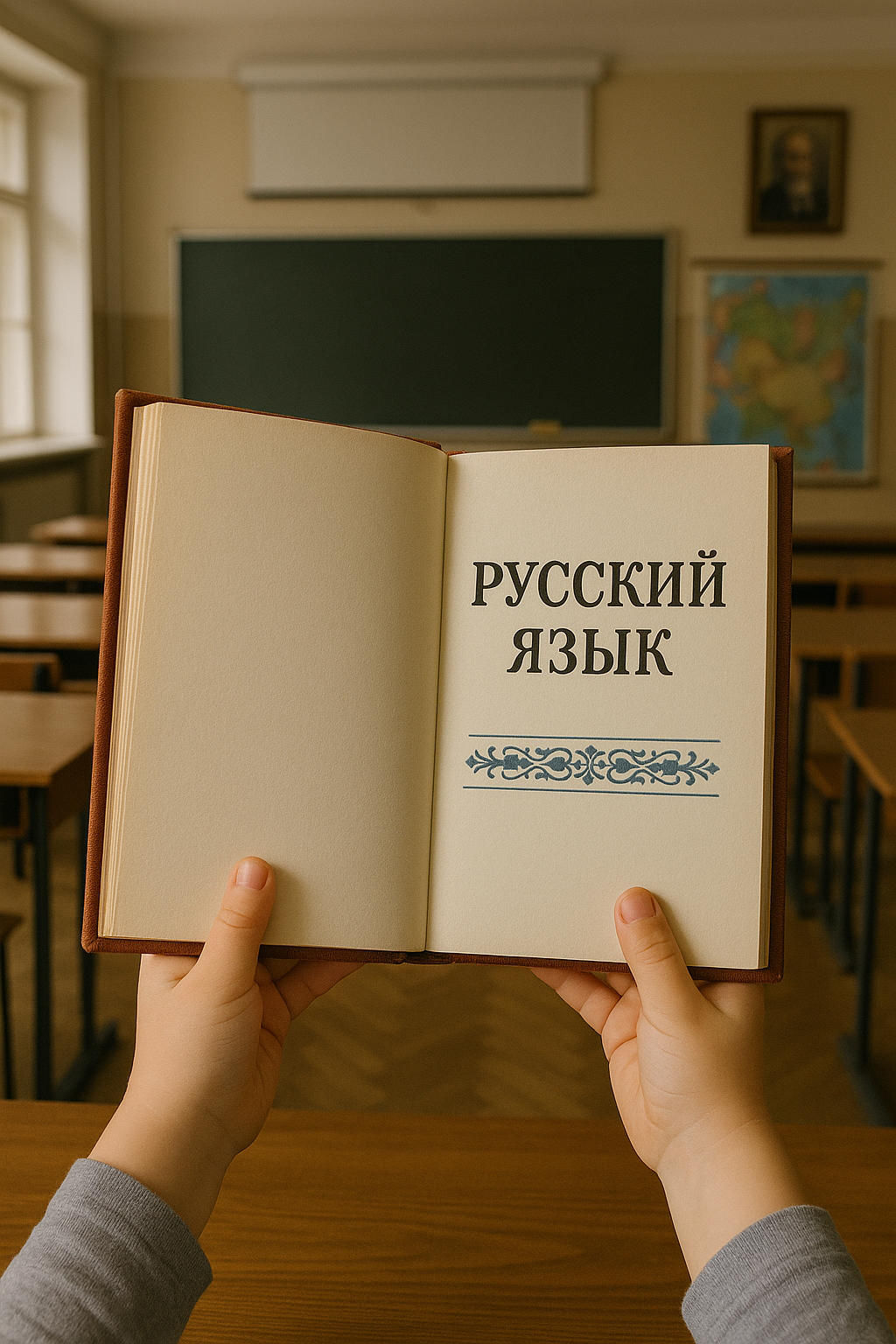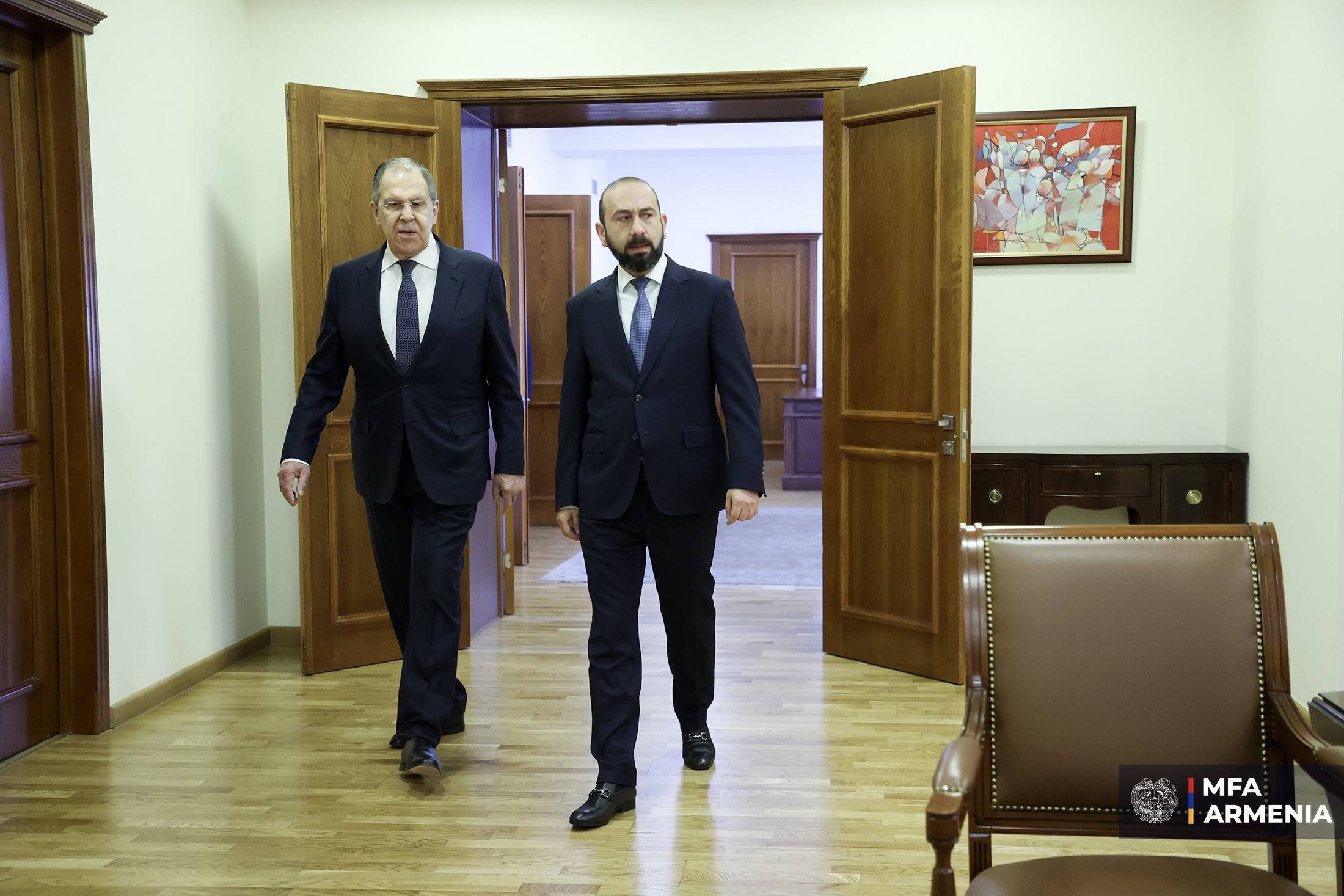Week In Review: Tests, Visits, and More...
 Photo: Orda
Photo: Orda
Orda has put together a brief synopsis of last week's news.
Russia: Education Access And Labor Deficits
Since April, Russia has continued tightening its migration policy, particularly in relation to underage foreign citizens seeking access to public education. In several regions, school admission for foreign children now depends on passing Russian language diagnostics or enrolling in state-provided language support programs.
State Duma Chairman Vyacheslav Volodin claimed that out of 1,762 applications submitted for testing, 81% were rejected. The rejections primarily stemmed from incomplete documentation, data errors, or a lack of available school placements, suggesting bureaucratic hurdles from ground zero.
It is also unclear if there was any facilitation in properly completing said documents.
Only 335 children were approved to take the exam; 44 participated, and only 27 passed. Parents may face administrative penalties or deportation if they do not enroll their children in required language courses, potentially increasing their financial burden.

At the same time, AsiaPlus reports that an October monitoring initiative found that 58% of migrant children passed language diagnostics, 23% faced learning difficulties, and 18% had little to no knowledge of Russian. The diagnostics involved 154,800 children, 74.4% of migrant students in the country. The initiative had full coverage in 28 regions, with varying degrees of participation elsewhere.
Legislation passed in late 2024 mandates both language testing and verification of legal residency as prerequisites for school admission, which are part of a larger legislative push targeting illegal migration.
Further changes include the creation of a new Migration and Citizenship Service within the Ministry of Internal Affairs, signed into law by President Vladimir Putin on April 2. The service, led by former Deputy Prosecutor General Andrei Kikot, is staffed with over 40 generals and aims to centralize oversight of foreign citizens’ registration and status.
It replaces the former General Directorate for Migration Issues. New general-major-level leadership positions have been created across 28 regions, including Moscow, St. Petersburg, and several Russian-occupied Ukrainian territories. Its necessity is questionable, as it is more or less a reshuffling of active internal affairs officers, a body known for corruption.
Indeed, human rights advocates have also raised concerns about the effectiveness and intent of these structural changes. Stefania Kulaeva of the Anti-Discrimination Center "Memorial" labelled the new service as a cosmetic reform, linking it to the February launch of a "controlled persons registry" for foreigners subject to expulsion.
Against that backdrop, lawmakers from the "New People" party proposed a "vigilance payment" system, offering financial rewards for reporting violations concerning visas, work permits, or proper registration. They also suggested raising fines for undocumented migrants to 100,000 rubles and allowing confiscation of property, with half of the proceeds awarded to informants. Nothing has come of this so far.
Russian lawmaker Sergey Mironov also told URA.RU that people entering Russia should be required to present voluntary medical insurance that includes coverage for pregnancy and childbirth, effectively stripping foreign nationals of such free medical services.
Meanwhile, Investigative Committee head Alexander Bastrykin reported a 15% rise in "migrant-linked crimes" in early 2025 compared to the same period in 2024, including a threefold increase in terrorism-related cases.
Back in April, Security Council Secretary Sergei Shoigu seemingly debunked the notion that crimes are rising due to labor migrants. He stated that the overall crime rate among them slightly declined in 2024, totaling 38,578 cases, 2% of all crimes, saying roughly 1,500 individuals were stripped of Russian citizenship for committing "severe crimes."
Shoigu noted that over 10% of foreign nationals exceeded legal stay limits, and authorities issued 3.4 million administrative violation reports. This, coupled with the statistics of citizenship revocation, follows the rhetoric that there are still lawbreakers among them.
He also declared that security forces are "underequipped," perhaps hinting at the need for "additional financing."
In this context, the Central Asian nations have previously expressed concern over how their citizens are treated in Russia, with Tajikistan and Uzbekistan making gestures regarding coordination between law enforcement. Plans to build Russian-language schools in Kyrgyzstan, Uzbekistan, and Tajikistan have also been previously announced, though the scale seems relatively limited.
Still, Tajikistan declared intentions to increase the number of its citizens working abroad, while Tashkent has shifted responsibility and liability for deportations to its citizens. All three nations house exam and "professional" preparation centers as well, and proposals on increasing the presence of Russia's multifunctional visa facilities have emerged.
Economically, labor migrants sent over $14 billion abroad in 2024, explaining the push to maintain such economic contributions. Remittances sent to Tajikistan also surged by 27 percent in 2024, reaching $5.8 billion.
These remittances have traditionally comprised a notable portion of each nation's GDP, particularly Tajikistan's, yet Russia's policies and the overall atmosphere have pushed people to search for opportunities elsewhere. The scale and longevity of this trend have yet to be seen, however.
Amid bans on specific occupations for foreigners, Russian MP Sergey Mironov has proposed a 3% fee on cross-border remittances to generate state revenue, criticizing what he sees as a lack of taxation on foreign workers, while Russia continues to endure its self-induced labor deficit.
Given said demand, the Russian authorities' visible scapegoating of foreign nationals seems more like a political diversion, but that does not necessarily mean that no one views them as the root of the problem.
A Visit, Or A Soapbox?
Russian Foreign Minister Sergey Lavrov visited Yerevan to discuss Armenian-Russian relations, regional developments, and international security. The event was preceded by a tangible tension between the two nations, primarily driven by the Collective Security Treaty Organization's failure to respond in a time of Yerevan's need.
In parallel, Yerevan has also advanced its "EU membership bill" significantly, though the bid has been interpreted as a signal to prompt Russia to engage more.
Incidentally, one of Lavrov's aims was Armenia's continued engagement within the Eurasian Economic Union (EAEU) and mutual interest in maintaining close strategic cooperation, thus explaining his statements regarding arms sales to Azerbaijan and alleged pressure on Armenia’s foreign policy direction.

He asserted that both countries had long utilized Russian weapons and that recent transactions were either settled or redirected without outstanding issues, rejecting comparisons between Armenia’s geopolitical choices and Ukraine’s situation.
Lavrov also affirmed Armenia’s sovereign right to chart its course, highlighting the significance of Russia’s military base in Armenia as a key element of regional security. He also emphasized the value of ongoing military and security cooperation. Additionally, Lavrov rehashed the "3+3" regional platform, involving Armenia, Azerbaijan, Georgia, Russia, Türkiye, and Iran.
However, its efficiency and intentions have long been debated, considering Russia occupies territory recognized as Georgian, a topic that the seemingly Moscow-friendly Georgian leadership has not forgotten.
Addressing the 2022 clash between Azerbaijan and Armenia, Lavrov noted that the CSTO (Collective Security Treaty Organization) swiftly dispatched an observer mission, producing a detailed report with actionable recommendations to stabilize the situation.
Most of Lavrov's responses seemed more like deflections than actual responses, particularly considering Russian peacekeepers ultimately failed to act during Baku's 2023 offensive, a topic that remains sensitive in Armenia, and more recent border fire claims on the Azerbaijani Ministry of Defense's part.
Regardless, Armenian Foreign Minister Ararat Mirzoyan affirmed that Armenia does not intend to reform its alliance with Russia. He also clarified that Armenia has not applied for EU membership, followed by Lavrov's claim of "widespread dissatisfaction" with Europe's security architecture.
Moscow seems more keen on maintaining influence over Yerevan, and the Kremlin is unlikely to unsettle Ankara-backed Baku after recently making efforts to ease tensions over the AZAL Plane Crash, including a Russian insurance company paying compensation.
Latest news
- The War in Iran Opens a Window of Opportunity for Kazakhstan’s Oil Sector, Analysts Say
- Iran Conflict Escalates Beyond the Gulf: What Kazakh Experts Say About Risks for Central Asia and Kazakhstan
- Kazakhstan Prepares Possible Evacuation of Its Citizens From Iran
- LRT in Astana Is Reaching the Finish Line: The Launch Is Expected in the Coming Months
- Kazakhstan Ready to Help the UAE Amid Escalation in the Region
- Tokayev Discusses Middle East Escalation With Qatar’s Emir
- Airlines Ready to Bring Kazakhstanis Home From the Middle East
- Tokayev Sends Support Messages to Gulf Leaders Amid Regional Escalation
- Kazakhstan Bans Its Airlines From Flying Over Several Middle East Countries
- Astana Strengthens Security Measures Amid Escalation Around Iran
- Tokayev Meets U.S. Ambassador Stufft, Discusses Board of Peace Cooperation
- Mangystau Launches AI-Assisted School Monitoring to Prevent Teen Suicidal Behavior
- Kazakhstan to Supply UK With Critical Minerals
- AI Faculties for Educators to Open in Kazakhstan: What Other Changes Are Coming to the Education Sector
- There Are Medals — But Not Enough Ice: What’s Happening to Figure Skating in Kazakhstan
- Is Kazakhstan’s Nuclear Power Plant Project at Risk After New UK Sanctions? Rosatom Responds
- Prosecutor General’s Office Suspends Extradition of Navalny Ex-Staffer Detained in Almaty
- Former EBRD Executive Jürgen Rigterink Elected as New Independent Director on Bank RBK’s Board of Directors
- Kazakhstan Near Bottom of Retirement Comfort Ranking
- Kazakhstan to Open New International Flights Across Asia, the Middle East and Europe

